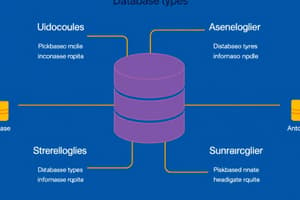Podcast
Questions and Answers
What term describes the issue where one transaction reads data from another transaction that has not yet been committed?
What term describes the issue where one transaction reads data from another transaction that has not yet been committed?
- Unrepeatable read
- Cascading rollback
- Dirty read (correct)
- Incorrect summary
Which situation exemplifies the incorrect summary problem?
Which situation exemplifies the incorrect summary problem?
- Transaction T reading updated item X after T1 fails.
- Transaction T reading the same item multiple times successfully.
- Transaction T calculating aggregate functions while others modify the data. (correct)
- Transaction T conducting operations without any transaction interference.
What is the main risk associated with cascading rollback?
What is the main risk associated with cascading rollback?
- Transactions complete successfully without interdependencies.
- Data integrity is improved across transactions.
- Databases become permanently locked.
- Multiple transactions become dependent on each other's failure. (correct)
When does the unrepeatable read problem occur?
When does the unrepeatable read problem occur?
What is the outcome of a recoverable schedule in transaction management?
What is the outcome of a recoverable schedule in transaction management?
Which of the following is NOT a characteristic of a non-recoverable schedule?
Which of the following is NOT a characteristic of a non-recoverable schedule?
Which of the following protocols is designed to ensure that a transaction is either fully completed and committed or has no effect?
Which of the following protocols is designed to ensure that a transaction is either fully completed and committed or has no effect?
What is a potential problem when a transaction reads the same item multiple times under different states of updates?
What is a potential problem when a transaction reads the same item multiple times under different states of updates?
What defines a recoverable schedule in a database system?
What defines a recoverable schedule in a database system?
Which of the following can lead to a cascading rollback?
Which of the following can lead to a cascading rollback?
In a non-recoverable schedule, what happens if a transaction fails after being read by another transaction?
In a non-recoverable schedule, what happens if a transaction fails after being read by another transaction?
What does a cascadeless schedule ensure?
What does a cascadeless schedule ensure?
Which of the following statements about the practice question is true: 'Sc: r1(X); w1(X); r2(X); r1(Y); w2(X); c2; a1;'?
Which of the following statements about the practice question is true: 'Sc: r1(X); w1(X); r2(X); r1(Y); w2(X); c2; a1;'?
What is a potential consequence of a cascading rollback?
What is a potential consequence of a cascading rollback?
Which commit protocol is primarily a preventive measure against cascading rollbacks?
Which commit protocol is primarily a preventive measure against cascading rollbacks?
Which of the following best describes the role of the DBMS with regard to concurrent schedules?
Which of the following best describes the role of the DBMS with regard to concurrent schedules?
What characteristic disqualifies a schedule from being classified as cascadeless recoverable?
What characteristic disqualifies a schedule from being classified as cascadeless recoverable?
Why is a strict schedule generally considered safer for transaction management?
Why is a strict schedule generally considered safer for transaction management?
In the provided schedule, what is the primary reason it is deemed non-cascadeless recoverable?
In the provided schedule, what is the primary reason it is deemed non-cascadeless recoverable?
What aspect of transaction committing dictates whether a schedule can be strict recoverable?
What aspect of transaction committing dictates whether a schedule can be strict recoverable?
Which of the following statements correctly describes a non-recoverable schedule?
Which of the following statements correctly describes a non-recoverable schedule?
In the second analyzed schedule, why is it considered not strict recoverable?
In the second analyzed schedule, why is it considered not strict recoverable?
What consequence is inherent in a situation with cascading rollbacks?
What consequence is inherent in a situation with cascading rollbacks?
Which of the following correctly refers to a schedule that executes operations in a way that no transaction reads uncommitted data?
Which of the following correctly refers to a schedule that executes operations in a way that no transaction reads uncommitted data?
Flashcards are hidden until you start studying
Study Notes
Recoverability
- Every concurrent schedule must be recoverable by imposing a specific ordering on transaction commits
- Recoverability means that if a transaction aborts, the database must be restored to a consistent state, which could require significant rework.
- Cascading Rollback (or Cascading Abort) occurs when a failed transaction committed some changes, and other transactions read those changes before the failed transaction was rolled back
- Cascadeless Schedule prevents cascading rollbacks by forbidding the reading of data from uncommitted transactions
- Strict Schedule is even more restrictive: it only allows reading and writing from committed transactions.
Examples of Recoverable Schedules
- Not recoverable
- Schedule: r1(X); w1(X); r2(X); r1(Y); w2(X); c2; a1;
- Recoverable, not cascadeless recoverable
- Schedule: r1(x), r2(z), r1(z), r3(x), r3(y), w1(x), w3(y), r2(y), w2(z), c1, c3, c2
- This schedule is not cascadeless recoverable because T3 (uncommitted) writes to y, and the T2 read the value of y from T3 before T3 committed
- Recoverable, cascadeless recoverable, not strict recoverable
- Schedule: r1(x), r2(z), r3(x), r1(z), r2(y), r3(y), w1(x), c1, w2(z), w3(y), w2(y), c3, c2
- This schedule suffers from dirty read problem, as T1 updates x and fails before completion, causing the system to rollback x, while T2 reads the temporary, non_committed value of x
- Strict Recoverable
- Any schedule where transactions commit in the same order as they are completing their tasks.
- It avoids dirty reads and W-R issues, making it a good choice for ensuring data consistency.
Transaction States, Concepts
- Incorrect Summary Problem may arise when a transaction calculates an aggregate summary based on data that is being modified by other transactions.
- This can lead to inconsistent sum, average, or count results.
- Unrepeatable Read Problem occurs when a transaction reads the same item twice and in between the reads, another transaction changes the value.
- It produces inconsistent results for the same data points.
- Recovery is Needed to ensure that either all the operations in a transaction are completed successfully and committed, or the system is rolled back to a consistent state.
Studying That Suits You
Use AI to generate personalized quizzes and flashcards to suit your learning preferences.




